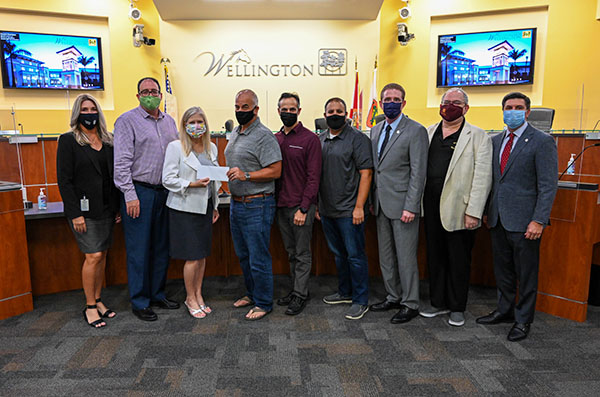
By Joshua Manning
The Wellington Village Council agreed Tuesday, Oct. 26 to purchase a 45-acre parcel along Flying Cow Road to expand and enhance the adjacent Wellington Environmental Preserve at the Marjory Stoneman Douglas Everglades Habitat.
The total purchase price is $4.5 million, but the majority of that will be paid for by the Florida Communities Trust Grant Program. Wellington’s 25 percent share of the cost is approximately $1.1 million.
Deputy Village Manager Tanya Quickel said that the purchase agreement with the Moncada family trust was based on the letter of intent approved by the council at its Oct. 12 meeting. She reiterated the village’s plan to expand the adjacent 365-acre preserve, which serves as a passive park, as well as a cleansing marsh and a major water storage facility for the village. The additional land will add 30 million gallons of offline water storage to the village’s capabilities.
Village Attorney Laurie Cohen noted that wording will be included in the deed that reverts the land to the state if Wellington does not use the land for its intended purpose for environmental and conservation uses.
“How did we arrive at this purchase price?” Councilman Michael Napoleone asked.
Quickel explained that three appraisals were done, and the purchase price was based on those appraisals.
“So, no matter what the property appraiser’s web site says about the value of the property, we are paying the appraised value for the property,” Napoleone confirmed.
Other ways of getting the property would be more costly and would not get support from the state. For example, using eminent domain would make it ineligible for the grant, because the grant money must be used for a sale with a willing seller, Quickel explained. Meanwhile, eminent domain would end up being approximately the same price, because the price would be based on similar appraisals.
“Eminent domain is a very long and very expensive process,” Cohen said, adding that there would be significant legal fees as well.
Resident Bruce Tumin again objected to the purchase, as he did at the Oct. 12 meeting. He asserted that the value of the land is inflated, and the village should look to other property to meet its needs. “This property is very difficult to develop,” he said. “We are paying $4.5 million for swampland.”
Mayor Anne Gerwig pointed out that the village’s $1.1 million investment does not include the cost for retrofitting the land into the adjacent preserve.
“This is just acquiring the property,” she said. “It does not include the costs for bringing it into the environmental preserve, which would require engineering work.”
Village Manager Jim Barnes confirmed that the village has not yet spoken with the South Florida Water Management District and other possible partners on that part of the project.
The council approved the purchase 4-0 with Councilman Michael Drahos absent. The agreement requires a closing date by Dec. 23, 2021.
In other business:
• The council agreed to postpone a decision on whether to allow a Type 2A congregate living facility for senior citizens in a modified structure that is both sides of a duplex located at 12450 Guilford Way. The proposal generated a great deal of opposition from neighbors when discussed by the Planning, Zoning & Adjustment Board in September.
The developer requested a postponement for at least a month in order to continue making changes with the goal of making the project more acceptable to skeptical neighbors. However, the request was submitted very late, and the council did not have to postpone the item. Council members were concerned that a number of residents were in the room ready to speak on the issue.
At the meeting, residents of Guilford Villas submitted a petition signed by more than 100 residents opposing the project. Meanwhile, the developers have redesigned the parking at the facility and are undertaking a traffic study of similar facilities. They plan to meet with residents in November with an updated plan.
“We have all been contacted by the community, mostly opposed to this plan,” Napoleone said. “The fact that you want to go back and try to garner more community support is what we would like to see.”
The council agreed to a one-month postponement but did not set a specific date. Residents were urged to return to express their opinions when the project returns.
• The council approved the final reading of the village’s new ordinance regulating hedges, fences and walls.
“The intent here is to create a consistent appearance for fences, walls and hedges along thoroughfares in Wellington,” Assistant Planning, Zoning & Building Director Michael O’Dell explained.
The village has set up a four-step program to implement the ordinance. This includes fence replacement, removal of non-confirming hedges, installation of irrigation and installation of new hedges.
Changes from the first reading include modifying the mesh privacy screens and clarifying that the goal is to have eight-foot uniform hedges in the community. Hedge materials must be planted two to three feet apart based on the type of plant. Specific colors of fences and walls are not included and will be adopted separately by the Architectural Review Board.
The final version of the ordinance confirmed the council’s previous request to make the phase-in five years, rather than seven years. Now all hedges must comply by Dec. 31, 2026.
Resident Johnny Meier asked about existing hedges using materials other than the approved plants. O’Dell confirmed that nonconforming hedge materials that are being maintained properly can be allowed by the ARB. He also noted that while a hedge is required, a fence is not required if the homeowner doesn’t want it.
The final reading of the ordinance was approved 4-0.







